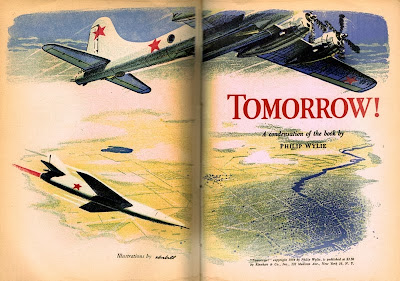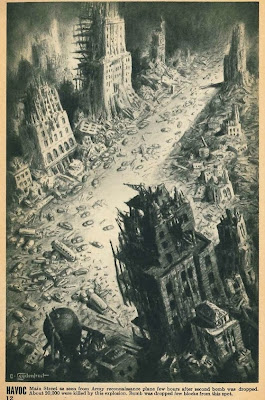3 / 5 Stars
Philip Wylie (1902 –1971) wrote a number of apocalyptic sf novels, with ‘When Words Collide’ (1933) perhaps his best known work. ‘Tomorrow’ (1954) and ‘Triumph’ (1963) were nuclear war novels, very much the spiritual predecessors to Streiber and Kunetka’s 'Warday' (1984). Wylie's posthumous novel, ‘The End of the Dream’ (1972) was an eco-disaster novel.
Wylie had considerable experience as a reporter and writer on the atomic bomb and its implications for national defense and world peace. During the mid-1940s Wylie was an advisor on matters of nuclear weapons to senator Brien MacMahon, who chaired United States Senate Special Committee on Atomic Energy. MacMahon introduced the bill for the Atomic Energy Act of 1945, which in turn created the Atomic Energy Commission in January 1947. Wylie also served on the Dade County, Florida civil defense council.
illustration by Alexander Leydenfrost for 'If A-Bombs Blast US City', from the February, 1951 issue of Pageant magazine
Wylie’s attitudes toward nuclear war centered on the necessity of civil defense, and the need for the United States to maintain a massive retaliatory capacity in order to deter the Soviet Union from launching World War Three.
image taken from
‘Tomorrow’ was first published in hardback in 1954; this
Popular Library paperback, 288 pp, was released in February 1956.
A Readers Digest Condensed Books version, published in 1954, featured excellent illustrations by Ed Vebell; these can be viewed at the 'Today's Inspiration' blog.
illustration taken from
'Tomorrow' is essentially a polemic.....about Civil Defense.
The book takes place in the Midwest, in the twin cities of Green Prairie and River City. The narrative follows a cast of characters drawn from families living in the outlying middle-class neighborhoods of Green Prairie.
The Connors include Henry and Beth, sons Ted and Chuck, and daughter Nora. Next door live the Baileys, husband Beau, wife Netta, and daughter Lenore.
front cover of 'Atomic War !' No.1, November 1952, Ace Comics (US)
The Connors are devoted to Green Prairie’s Civil Defense Corps, dutifully reporting to exercises and drills, even as their relatives scoff at such nonsense. While her parents are indifferent to CD, Lenore Bailey serves as a radiation monitor, doffing a yellow overcoat and wielding a Geiger counter for her share of the local drills.
image taken from
Wylie spends the first three-fourths of the novel laying out the personalities and foibles of his cast, and this is a major weakness of ‘Tomorrow’, as most of its length is essentially occupied with suburban melodrama.
Later chapters give increasing hints of the apocalypse to come, and, if the reader sticks with ‘Tomorrow’ long enough, X-Day does arrive, and with it a nuclear attack on the twin cities. At this point the novel kicks into gear, and Wylie does a very good job of conveying the gruesome aftermath of a fission bomb detonation.
panel from 'Atomic War !' No. 1, November 1952, Ace Comics (US)
Needless to say, those characters who scoffed at CD get their just desserts, even as Wylie overlooks some aspects of a nuke detonation - such as the scope and effects of fallout - that would in large part nullify many CD efforts.
image taken from
As a 'what if' novel, 'Tomorrow' exhausts too much of its content on tedious expositions in which author Wylie excoriates those of his fellow citizens who are too lazy and stupid to recognize that Civil Defense was a vital part of their duties as Americans.
The nadir of this approach to storytelling comes near the book's midpoint, when Wylie has a newspaper editor deliver a 14-page screed that, among other things, touches on the evils of McCarthyism, the futility of negotiating with Commies, and idiocy of entertaining the 'it can't happen here' mindset of the petite bourgeoisie.
In summary, if you're willing to overlook the fact that much of 'Tomorrow' is overbearing, it succeeds to some extent as a work of sf about World War Three and nuclear devastation.
The nadir of this approach to storytelling comes near the book's midpoint, when Wylie has a newspaper editor deliver a 14-page screed that, among other things, touches on the evils of McCarthyism, the futility of negotiating with Commies, and idiocy of entertaining the 'it can't happen here' mindset of the petite bourgeoisie.
I
won't disclose any spoilers, but I thought 'Tomorrow' hit a false note
in its concluding chapter.....I was hoping to see some evidence of the sort of black (some would say sick) humor that marks the 'Fallout 3'
franchise, but it simply doesn't make an appearance.
illustration by Alexander Leydenfrost for 'If A-Bombs Blast US City', from the February, 1951 issue of Pageant magazine
In summary, if you're willing to overlook the fact that much of 'Tomorrow' is overbearing, it succeeds to some extent as a work of sf about World War Three and nuclear devastation.

































